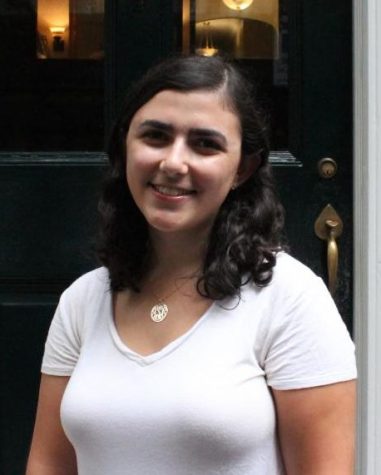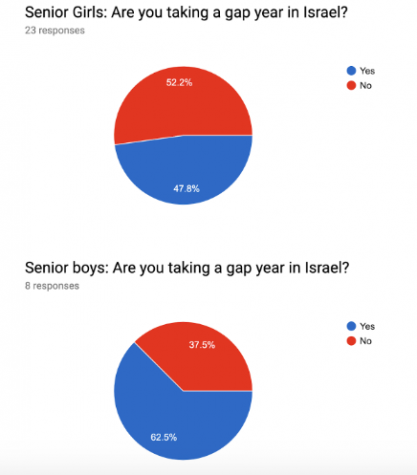The Class of 2019: A Year in Israel?
Every year, seniors spent large blocks of time planning for after high school. The most discussed decision is about where to go to college, but seniors also make another important decision: whether or not to take a gap year in Israel. Many factors go into this decision. For some, a year in Israel is an opportunity to strengthen their Jewish identities or connect to Israel. For others, it’s a time to reflect before starting college.
According to Ms. Krupka, most years, 50-65% of students take a gap year in Israel. One year, this number reached about 70%, and another year, it dropped into the 40s%, but it’s still unclear what causes these variations. For the class of 2019, it’s about average, with approximately 55% of students taking a year in Israel, though the exact numbers haven’t yet been calculated.
When asked about Ramaz’s attitude toward taking a year in Israel, Rabbi Schimmel said that it’s “something the school believes in.” However, “we recognize that everyone is different…and each person has their own unique situation,” he continued, “it might not work for everyone…but in general we think each person should at least consider it.”
Each student has different goals for their year in Israel, which impacts the decision about what program to attend. “We try to help students talk out what they really want to gain from the year,” said Rabbi Schimmel, “For some it’s academic and intellectual, for some it’s cultural, for some it’s time to relax before being back in a college/work environment, and for some it’s time to gain maturity.” Figuring out what a student wants to gain from their gap year is the best way to determine what program would be the best fit.
“I felt that it was important to take the year off to focus on myself and not have to worry about work,” said one senior, “It is a time for me to grow and to learn without any stress.”
At the end of junior year, each student is assigned an Israel advisor who can help them make this decision. Rabbi Gober and Rabbi Weiser advise the boys, and for the class of 2019, Rabbi Schimmel and Ms. Krupka are the girls’ advisors. For the class of 2020, Ms. Senders is taking over Ms. Krupka’s slot. Advisors are available to meet with students at the end of their junior year and throughout their senior year to help them make these decisions, but these meetings aren’t necessarily mandatory.
“I thought the Israel guidance office did a really good job about being open to students who simply didn’t want to go, and there wasn’t a lot of pressure,” said another senior, “Interestingly enough, other Judaic studies teachers who weren’t my advisors pressured me to go to more than my advisor did.” Most seniors agreed with this sentiment, with 81% of seniors who are taking a gap year and 64% of seniors who aren’t taking a gap year believing that the Israel guidance office doesn’t overly pressure students to go to Israel.
For some students, a year in Israel isn’t the right fit. “I was very excited to go to college, and Israel felt like putting my life on hold for a year,” said one senior, “I don’t do well away from home, and Israel is really, really far. I also felt like the whole yeshiva league scene in Israel wasn’t for me.” Other often-cited reasons not to go included students’ parents not allowing them to take a gap year, being excited for college, and not finding a program that was the right fit.
For many students, a gap year in Israel offers a chance to grow religiously and personally, but it isn’t the right choice for everyone. Looking ahead to the class of 2020, based on a poll posted on Schoology, 41% of juniors are planning to take a year in Israel and 28% are planning not to, with the other 31% undecided.

Josephine Schizer has been writing for the Rampage since her freshman year and is excited to be serving as Co-Editor-in-Chief. Outside of Rampage, Josephine...




